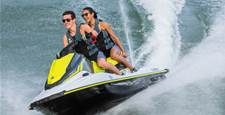Two of Australia’s most high-profile divers Melissa Wu, 20, and Alex Croak,27, take us through the life and leaps of a 10m platform diver
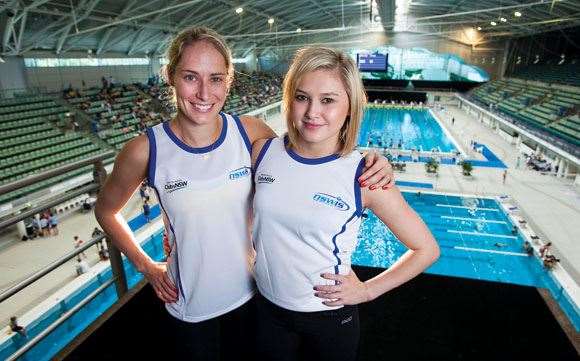 Photos By, Warren Clarke
Photos By, Warren ClarkeTwo of Australia’s most high-profile divers Melissa Wu, 20, and Alex Croak,27, take us through the life and leaps of a 10m platform diver
Ten-metre platform diving is as close as the Olympics gets to the X-Games. A glance up at a concrete cliff edge at any public pool with diving infrastructure ends any doubt as to just how scary it would be for a mere mortal to leap off the top. “Watch me,” your boof-headed mate might boast, before ascending the tower’s steps. “After a few beers for some Dutch courage first ...” Surely this is a pursuit reserved for only the most fearless of athletes? Add in the physical demands of performing a range of pikes, tucks and twists, all before hitting the water at 60km/h without making so much as a ripple on entry and, come to think of it, those X-Games look a little tame ...Two of Australia’s most high-profile divers are Melissa Wu, 20, and Alex Croak, 27. You’ll remember Wu from Olympics and Commonwealth Games past as that fresh-faced kid who looked like she should be at home dreaming of one day performing on the world stage instead of actually winning gold and silver medals. Watch out for her again at London 2012. And Croak? No, you aren’t going insane – you saw her in her previous life at Sydney in 2000 representing her country in gymnastics. In 2010 she became Australia’s first-ever Commonwealth Games gold medallist in two different sports.From their NSWIS Homebush base, they take us through the life and leaps of a 10m platform diver
TIMETABLE
MELISSA: “All our afternoons [1.30-4pm] are the same. We train for about two and a half to three hours at the pool. In the mornings we’re at the gym Monday, Wednesday and Saturday [6-8.30am] and then the other mornings we’re at the pool working on our diving skills.”
DIVING BASICS
M: “The basics of a dive depend on what type you’re doing, but I guess the main aspect of any dive is a good top; you need to be dynamic off the platform. You need to jump high and start your rotation pretty quickly. Once you’re rotating, you need to be in a tight pike or a tight tuck, basically in a small position so that you’re able to rotate at a high speed.
“When you’re vertical you need to make sure that you’re not out of alignment so you get a clean entry. And then when you hit the water, obviously you have to stay tight.”
MUSCLING UP
M: “Divers rely heavily on their legs and abdominals, but we work on everything at training, including our calves, arms, triceps, biceps and hamstrings. We use a lot more muscles than a lot of diving outsiders realise.”
ALEX: “We work on any area we can to help make our movements explosive and dynamic.”
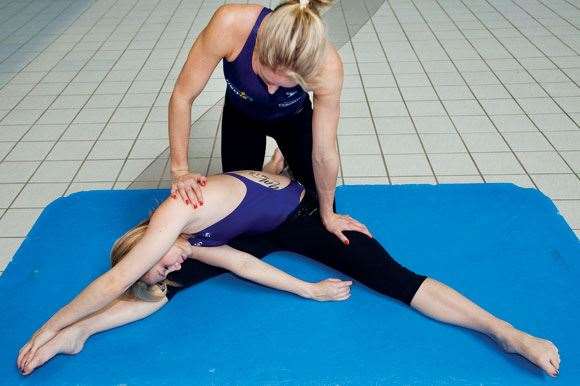 Photos By, Warren Clarke
Photos By, Warren ClarkeIN THE GYM
A: “We do a lot of squats and things like that. A lot of plyometrics; jumping. We also do a lot of sommersaults of a morning and afternoon.”
M: “We usually combine them with abdominal exercises in between. A lot of our ab work is specifically diving-related; a lot of pike positions are incorporated.”
A: “We do a lot of box jumping, hurdle jumping, medicine ball, squat jumps. Basically we do three gym sessions a week; one day will be a heavier squat day. The next day in the gym will be a more dynamic day with maybe a med ball so it’s not just squats, which are a static exercise.”
M: “Half the stuff we do is squatting, in terms of legs, which builds up our strength, and then we do a lot dynamic stuff like jumping with weights to improve and use the strength we’ve built up in a dynamic way.”
MAT FINISH
M: “Mat work is the foundation for all our dives. On top of all our strength work, we also need the skills to be able to execute our dives in the water. The stuff on the crash mats is very much diving-specific; focusing on take-offs, etc. So that when we’re on the platform, they’re easier to execute; we’ve done it a thousand times, we know exactly what we’re doing and how to do it.”
HITTING THE WATER
M: “We practise what we call ‘entries’ by executing the simplest dive we can do. We practise getting our line-up right for when we transfer to our higher dives.”
JOB SATISFACTION
M: “I’d definitely say I prefer actual diving practice to squatting in the gym, for example, but we know it’s all part of it. In order to dive, you need to do squats in the gym. For me, and I guess for any athlete, the strength stuff isn’t as fun, but is required for us to do well in the sport.”
A: “The most enjoyable part for me is training synchro, as opposed to training on my own. I prefer the days where I get to dive with Melissa than the days I have to dive on my own. You’re up there together and if it’s a hard day you have someone to talk it out with ... Some days we talk a little bit too much, so the sessions go a little bit longer than expected ... ” }
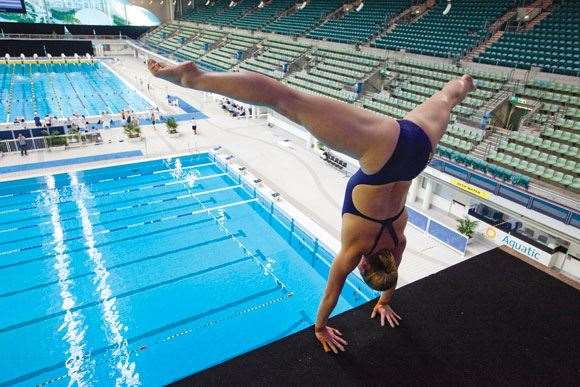 Photos By, Warren Clarke
Photos By, Warren ClarkeNO SWIMMING
A: “A lot of people think we do a lot of swimming training ... but we don’t.”
M: “We kind of make a joke about it; we explain that the only swimming we do is from where we land in the water, back to the edge of the pool ... Then there’s a lot of people who think that there’s no training required in diving at all. As we’ve explained, it’s actually quite strength-based ... ”
A: “ ... We don’t just walk up some stairs
and fall off.”
FIGHTING NERVES
M: “I’ve always gotten nerves and always will, but I’ve definitely been able to deal with them better over time. I guess that just comes down to experience. Nothing anyone can say to you will make you feel any less nervous. No matter what you say to yourself, it’s just practice and experience that will help you deal with nerves better and help you lift to the occasion rather than letting them get to you.”
A: “I’m a nervous competitor, too. Even as a gymnast I was always very nervous competing, but that’s a good thing because it indicates you care about your performance. I’ve worked in the past and even now with a sports psych – not necessarily specifically for nerves, but all aspects of performance. Definitely sports psychology, as well as what Melissa says about experience, helps keep the nerves under control and keep you performing at your best.”
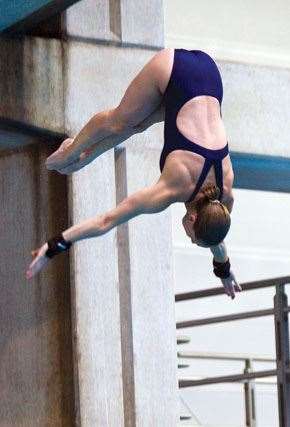 Photos By,Warren Clarke
Photos By,Warren ClarkeTAKE-OFF
A: “We can usually tell from our take-off whether we’re exactly in synch with each other.
I count, so Melissa jumps when I say ... I wear the pants in the relationship. Well, I count, anyway.”
M: “Alex pretty much says ‘ready, go’ and then we go. But we’ve practised it a million times.”
A: “You can kind of see in your periphery as you jump if you’re in time. We generally know at the take-off if we’re going to be spinning and hitting the water at the same time. We don’t just cross our fingers and pray that it’s all worked out ... ”
M: “Taking off and seeing your partner still standing up on the platform ... that’s not exactly what we’re after.”
A: “At the Test event in London in February, we were training, it was loud. There were so many people training with and around us; spring boarders, platform, etc. The spring boards make a loud sound if you miss the jump. As I said ‘ready, go’, a spring board made a really loud sound ... Melissa didn’t hear my ‘ready, go’, so you can guess how our timing ended up. She saw me start moving out of her peripheral vision and thought to herself, ‘Quick, I better get going,’ but she couldn’t catch me. And I couldn’t slow down, either. Our coach was like, ‘What the hell?’
“If you don’t hear the count, you’re totally lost. You really do rely on every one of your senses.”
FALLING DOWN
M: “When you climb up to the 10m platform for the first time it’s really scary and you have a lot of adrenalin. When I was younger and learning some new dives, it was always exciting, but really scary as well. Once you’ve been doing it for a while, you kind of take it for granted.”
A: “It’s not like a ‘free’ feeling, because you have so many twists and sommersaults to do before you hit the water.”
M: “Yeah, when you have a specific purpose of executing a complicated dive, you don’t get that feeling in your belly of losing your stomach, like when you’re diving into a pool while having fun.”
FUEL FOR THOUGHT
A: “Staying hydrated on a comp day is really important. When you’re in a pool environment for so long each day, it’s stressful, it’s sometimes warm, you can get cold, and it’s important to keep your fluids up. Any kind of energy on comp days is good.”
M: “On comp days, as opposed to training ‒ when you just come in for a block session and then you go ‒ you’re at the pool for pretty much the whole day. You tend to just snack more on comp days because you don’t want a big belly full of lunch or something.
A: “A little bit of food regularly ... ”
‒ James Smith
Related Articles
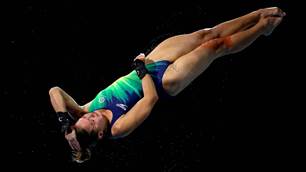
Wu: It means so much
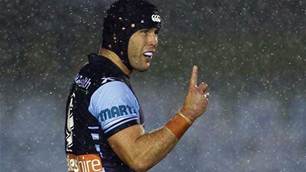
Training with the Cronulla Sharks' Michael Ennis







